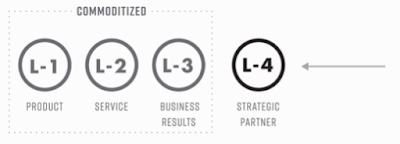Primeiro comecei por ler o título no Jornal de Negócios: "
Dono da Colunex: “Portugal é atractivo porque paga salários de terceiro mundo”". Depois, ouvi Camilo Lourenço no FB também fazer referência ao texto.
De onde vem o dinheiro para os salários? Do valor acrescentado, da riqueza criada pelas empresas. Como é a riqueza criada pelas empresas em Portugal? Recordar "
Riqueza produzida pelas PME portuguesas fica pela metade da média europeia".
Entretanto, no dia anterior tinha lido este texto de Ricardo Arroja, "
A qualidade da gestão. O que falta fazer" de onde sublinhei:
"A questão da medição da produtividade é, de resto, a área mais relevante. Aquilo que não é medido não pode ser avaliado. A questão é saber medir o que realmente interessa medir (algo que nem sempre acontece). Em geral, os empresários têm uma boa noção das suas receitas e dos seus custos. Todavia, frequentemente, estes mesmos empresários não sabem se estão a ganhar ou a perder dinheiro. Pode parecer paradoxal que um empresário conheça os seus proveitos e os seus custos, e que não saiba se está a perder ou a ganhar dinheiro. Porém, não é invulgar. Uma empresa cria valor se a rentabilidade operacional dos capitais investidos for superior ao custo médio ponderado do capital."
À tarde, numa empresa, perguntei ao contabilista se era possível fazer uma análise cliente a cliente para saber com quem uma empresa perdia dinheiro:
- Nem pense nisso!
Tudo isto se encaixa com uma série de postais: "
Tecto de vidro? Uma hipótese de explicação (parte XVIII)" e também joga bem com o postal de quinta-feira, "
Especulação perigosa".
Um tecto de vidro é uma barreira invisível. Ela está lá, mas ninguém a vê.
Uma citação que uso muitas vezes é:
"nature evolves away from constraints, not toward goals"
Querem salários altos?
Precisam de empresas com produtividades mais elevadas!
Como vamos a caminho de Mongo não se conseguem maiores produtividades a produzir em massa.
Como vamos a caminho de Mongo , maiores produtividades só se conseguem com uma subida na escala de valor.
Subir na escala de valor implica muitas vezes mudar de vida: encolher; mudar de mercados; mudar de clientes-alvo; mudar de proposta de valor; mudar de cultura; ...
Acham que é fácil?
Quase que parece o Brexit...
O Brexit é como o canto das sereias:
Conta-se uma estória, o povo engole e vota a favor da estória.
Ao pôr-se em marcha a estória alguns começam a perceber que as sereias afinal são rochedos ou monstros e querem voltar para trás, mas a corrente vai esmagar o navio.
Agora voltem à "
Especulação perigosa". Qual será o impacte de uma subida drástica do salário mínimo?
Até tenho medo de onde estas reflexões podem levar alguém.




















